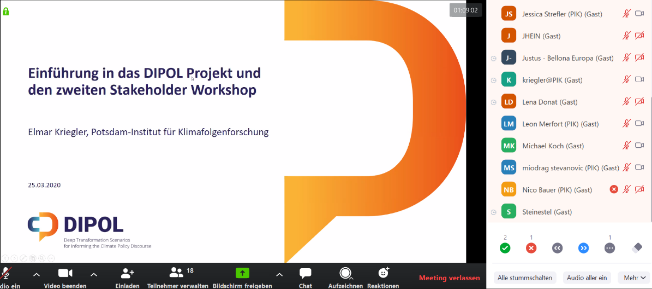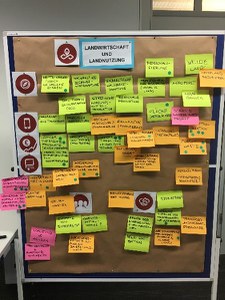Co-design of transformation pathways
A total of three stakeholder workshops will be held during the course of the project. The aim is to discuss social and political perspectives for the transition to an emissions-neutral economy together with interest groups from politics, business and civil society.
- Report on the First Stakeholder Workshop, March 2019
- Report on the Second Stakeholder Workshop, March 2020
- Report on the Third Stakeholder Workshop, September 2021
First Stakeholder Workshop, March 2019
The first stakeholder workshop brought together stakeholders from academia, business and civil society to outline future scenarios and possible transformation pathways that Europe and Germany could take to reach the 2030 reduction targets and the 2050 transformation goals.
To start with, the Potsdam Institute for Climate Impact Research (PIK) introduced the design and development process of scenarios. Besides various emission pathways, it presented the methodology, areas of application as well as assumptions and initial results of transformation scenarios. Following this, it presented the key elements and building blocks of a mitigation scenario for the five key sectors of the workshop (electricity, transport, buildings, industry, and agriculture).
In addition, the RWI - Leibniz Institute for Economic Research provided an insight into the analysis of the socioeconomic effects of a transformation process. The focus was on the question of causal analysis, which was explained using two examples, elasticity of prices for energy consumption and electric cars and transport infrastructure.
Afterwards, stakeholders discussed along five stations (electricity, transport, buildings, industry, and agriculture) possible visions for the year 2050, levers and hurdles in the areas of technology & innovation, economy & consumption, political framework conditions, distribution issues and possibilities of sector coupling. At each station, sector experts were available to join the discussion and establish the link to the modeling work. The workshop was concluded by the prioritization of the proposed aspects in terms of their importance and stakeholder interests as well as the final discussion of the results.
Second Stakeholder Workshop, March 2020
 On 25 and 26 March 2020, the second stakeholder workshop within the DIPOL project took place in a virtual format. At the beginning of the workshop, the modeling teams of the Potsdam Institute for Climate Impact Research (PIK) and the RWI - Leibniz Institute for Economic Research presented how the stakeholder contributions from the first workshop in March 2019 were used to develop seven different scenario narratives. These narratives represent a range of possible futures in terms of technological, political and behavioural changes.
On 25 and 26 March 2020, the second stakeholder workshop within the DIPOL project took place in a virtual format. At the beginning of the workshop, the modeling teams of the Potsdam Institute for Climate Impact Research (PIK) and the RWI - Leibniz Institute for Economic Research presented how the stakeholder contributions from the first workshop in March 2019 were used to develop seven different scenario narratives. These narratives represent a range of possible futures in terms of technological, political and behavioural changes.
After presenting and discussing initial findings from this scenario process, adelphi moderated an interactive exercise on how to further develop the narratives. Stakeholders were encouraged to concretise the scenarios through the eyes of different groups of people or "personas" and to identify proponents or opponents. Thanks to this approach, it was possible to take increased account of the effects of different decarbonisation paths at the individual or household level. The discussion also provided new insights into the nuances and trade-offs inherent in the scenarios and will help to adapt and refine the scenarios in the next phase of the development process.
Third Stakeholder Workshop, September 2021
On 7 September 2021, the third and final stakeholder workshop took place. At the beginning of the event, researchers from the Potsdam Institute for Climate Impact Research (PIK) and the RWI-Leibniz Institute for Economic Research presented their research results. The research team offered insight into six different scenarios broken down according to different dimensions (technology & innovation, coordination, behavioral change). They varied from a market-oriented approach to a behavioral and technology-oriented approach, and to a policy-steering approach. The effects of using the current approach were also analyzed. Scenario comparison made clear which adjustments are required to set up a transformation process.
The participating stakeholders from business and civil society shared their assessments of the scenario narratives according to the DIPOL co-creation approach. They expressed the need for a concrete translation of the research results into recommendations for action. Also, basic needs for political implementation became clear: politicians need to create the necessary framework conditions and ensure infrastructure expansion, administration needs to design guidelines for climate-friendly measures.

